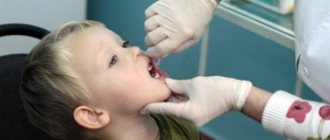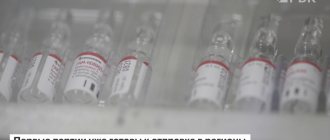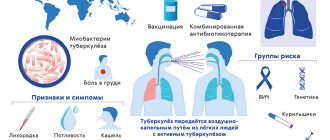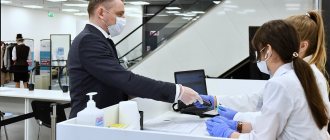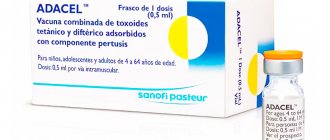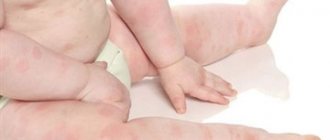As with any medical drug, there are contraindications for vaccinations against COVID-19.
Photo: Nikolay OBEREMCHENKO
In the context of a new powerful outbreak of Covid, more and more Russian regions are introducing mandatory vaccination against coronavirus for certain groups of citizens (primarily those who, due to their occupation, are actively in contact with others and can intensively spread the infection). However, as with any medical product, there are contraindications for vaccinations against COVID-19. Their list is determined by the instructions for each vaccine. Over time, it may change and be updated by developers with subsequent official registration of “edits.” In addition, methodological recommendations from the Ministry of Health have been developed on the procedure for vaccination with one or another drug. They also contain important points about when vaccination is not done (in addition to direct medical contraindications).
Komsomolskaya Pravda has collected and provides data that is relevant today.
“SPUTNIK V”: WHO SHOULD DELAY WITH THE VACCINATION
Contraindications are:
- hypersensitivity to any component of the Sputnik V vaccine or another vaccine containing similar components (this is determined by the doctor in the vaccination room when examining and interviewing the patient before vaccination);
- history of severe allergic reactions (these include: Quincke's edema, anaphylactic shock);
- acute infectious and non-infectious diseases - vaccination is carried out 2-4 weeks after recovery. For mild ARVI and acute infectious diseases of the gastrointestinal tract, vaccination can be done after the temperature has normalized;
- exacerbation of chronic diseases - vaccination is carried out 2-4 weeks after the onset of remission;
- age up to 18 years. Note: according to Moscow Deputy Mayor for Social Development Anastasia Rakova, clinical trials of Sputnik V for adolescents 12-17 years old will start in the capital from the beginning of July.
Two-component vaccine “GamCovidVac”, also known as “Sputnik V”.
Photo: Nikolay OBEREMCHENKO
! There are also certain contraindications for administering the second component of the vaccine. The patient is given a medical exemption from the second Sputnik injection if severe post-vaccination complications occur after the first injection. These include:
- anaphylactic shock,
- severe generalized allergic reactions,
- convulsive syndrome, temperature above 40°C, etc.
If, after the first injection, antibodies have not formed, and the second component of Sputnik is contraindicated, the doctor may decide to carry out a full course of vaccination with another vaccine - EpiVacCorona or CoviVac, the deputy director for clinical and analytical work of the Central Research Institute of Epidemiology told KP Rospotrebnadzor, Doctor of Medical Sciences, Professor Natalya Pshenichnaya . “Re-vaccination with another drug is possible no earlier than 3 months after the administration of a dose of the previous vaccine to which an allergic reaction occurred,” the expert clarified.
Absolute contraindications
Absolute bans on vaccination are determined if there is a high risk of developing conditions that threaten human health and life. That is, these include those cases when possible side effects after the procedure become more severe and dangerous than the expected benefits of the vaccination.
Excessive hair loss or alopecia is an alarming symptom indicating problems in the body. To determine its cause, it is necessary to undergo a series of tests, based on the results of which treatment will be prescribed. Read more in the article: “what tests to take for hair loss.”
Absolute prohibitions include:
- A severe allergic reaction that occurred earlier during the same vaccination. Such reactions include increased body temperature after vaccination, severe redness or swelling at the injection site.
- Complications when using a previous dose of the same vaccine - such conditions include a sharp decrease in blood pressure, the development of anaphylactic shock, encephalitis, and manifestations of convulsive syndrome.
- Immunodeficiency conditions - they can be either congenital (primary) or acquired (the result of AIDS, radiation or chemotherapy).
- Malignant neoplasms.
- All trimesters of pregnancy.
In immunodeficiency states, injections of live vaccines are prohibited - against mumps, rubella, measles, DTP, OPV, BCG. The use of inactivated vaccines is permitted, but it must be taken into account that there is a high probability of not achieving the desired result.
To check the composition of the blood and promptly identify hemostasis diseases, it is recommended to consult a hematologist. Before visiting a doctor, a series of laboratory and instrumental tests are performed so that the doctor can judge the person’s health status. Read more in the article: “what tests does a hematologist need at an appointment.”
“POSSIBLE, BUT WITH CAUTION”
For a number of severe chronic diseases, Sputnik V, as stated in the instructions, “is used with caution.” This means that in the vaccination office, in case of doubt, the patient can be referred for a preliminary consultation with a specialized attending physician (urologist, endocrinologist, neurologist, etc.). Let us clarify once again: these diseases themselves are not an “automatic” contraindication to vaccination. A medical exemption is given if the condition of a particular patient is unstable, and doctors believe that vaccination should be abstained at the moment.
Vaccination with Sputnik is carried out with caution for the following diseases:
- chronic liver and kidney diseases,
— endocrine diseases: severe dysfunction of the thyroid gland and diabetes mellitus in the stage of decompensation,
- severe diseases of the hematopoietic system,
- epilepsy and other diseases of the central nervous system (CNS),
- acute coronary syndrome, acute cerebrovascular accident,
- myocarditis, endocarditis, pericarditis (that is, inflammatory processes in the tissues of the heart).
During the vaccination of war and home front veterans against a new coronavirus infection in Yekaterinburg.
Photo: Alexey BULATOV
Update as of June 25, 2021: The Ministry of Health has lifted restrictions on vaccination of pregnant women with Sputnik V.
“ASSESS THE BENEFITS AND RISKS RATIO”
For some diseases, vaccination may pose a risk, according to the instructions for Sputnik V. However, coronavirus can often cause even greater harm to such patients. Therefore, “the decision to vaccinate should be based on an assessment of the balance of benefit and risk in each specific situation,” the document notes. This careful assessment should be carried out before deciding to vaccinate for:
— cancer patients;
- patients with autoimmune diseases.
In the latter case, stimulation of the immune system can lead to an exacerbation of the disease, the instructions emphasize. Great care should be taken in patients “with autoimmune pathology that tends to develop severe and life-threatening conditions.”
And one more important point. Patients who receive immunosuppressive therapy, that is, suppress the immune system (cancer patients, people who have undergone organ transplants, with autoimmune diseases, etc.), may not develop a sufficient immune response, the authors of the instructions warn. Therefore, taking drugs that suppress the function of the immune system is contraindicated for at least one month before and after vaccination. Only the attending physician can make a decision about adjusting medication intake.
Contraindications to live vaccines
Most often, so-called live vaccines are used to prevent diseases. They contain pathogens, but in a weakened form or minimal concentration, unable to provoke the development of the disease. Injections with live drugs are considered the most effective, since in response to vaccination the body reacts with increased production of specific antibodies. In the future, they protect the immune system from pathogenic viruses and bacteria.
Main restrictions on the use of live vaccines:
- allergic intolerance to vaccine components;
- presence of immunodeficiency states;
- body temperature above +38.5°C;
- all trimesters of pregnancy;
- age over 60 years (the immune system often weakens, which can lead to various complications);
- scars, moles, urticaria and dermatitis, warts and various skin lesions at the injection site;
- tendency to severe post-vaccination complications.
Also, restrictions due to which you will have to postpone the injection for some time include cancer, recent chemotherapy, various surgical interventions and herbs in the last six months.
STAY IN TOUCH
If you have already been ill or had contact with sick people before vaccination
If a person who came for vaccination had contact with patients with Covid over the last 14 days or showed any symptoms of infection during this period, then the patient should be given a referral for a PCR test for COVID-19 or a rapid test for the presence of coronavirus SARS-CoV-2. This rule is contained in paragraph 6.2 of the Methodological Recommendations “Procedure for vaccination with the GAM-COVID-VAC vaccine against COVID-19 in the adult population.”
Based on the same point, persons who have recovered from Covid and have a positive antibody test result “are not vaccinated.” Note: based on the latest data, taking into account the spread of a new dangerous strain of coronavirus, doctors urge those who have recovered to get vaccinated 7-9 months after the disease. However, if you maintain a sufficient antibody titer (at least two, and preferably four norms, depending on the reference values of a particular test) and compulsory vaccination has been introduced in your region, then, strictly speaking, you have the right to insist that you are not subject to it. based on the specified paragraph of the Recommendations of the Ministry of Health.
Update from 07/01/2021: The Russian Ministry of Health developed and released on 06/29/2021 new temporary guidelines “Procedure for vaccinating the adult population against COVID-19” . Based on this document, the presence of antibodies and their level are not checked and are not taken into account when deciding whether to vaccinate those who have previously been ill. Other details are in the kp.ru material dedicated to the new rules.
“EPIVACCORONA”: NOT EARLIER THAN A MONTH AFTER ACHIEVEMENT OF CHRONIC DISEASES
Contraindications are:
- hypersensitivity to the components of the drug (in particular, to aluminum hydroxide and others);
- severe forms of allergic diseases;
— a reaction or post-vaccination complication to a previous administration of the EpiVacCorona vaccine;
- acute infectious and non-infectious diseases, chronic diseases in the acute stage - vaccinations are carried out no earlier than a month after recovery or remission. For mild ARVI and acute infectious diseases of the gastrointestinal tract, vaccination is carried out after the temperature has normalized;
— immunodeficiency (primary);
- malignant blood diseases and neoplasms;
- pregnancy and breastfeeding;
- age up to 18 years.
Ampoules with the EpiVacCorona vaccine.
Photo: Nikolay OBEREMCHENKO
The vaccine is used with caution (for what this means, see the explanations in Sputnik above) for the following diseases:
- chronic liver and kidney diseases,
- severe dysfunction of the endocrine system,
- severe diseases of the hematopoietic system,
- epilepsy, strokes and other diseases of the central nervous system,
- diseases of the cardiovascular system (history of myocardial infarction, myocarditis, endocarditis, pericarditis, coronary heart disease).
The vaccine may pose a risk and is used after a physician has assessed the risk-benefit ratio for a particular patient:
- for primary and secondary immunodeficiencies,
- for autoimmune diseases,
- in patients with allergic reactions.
Relative contraindications
Relative contraindications to vaccination in adults are conditions that are temporary in nature and in which the injection may be dangerous or may not produce the expected immune response.
The main relative restrictions include:
- Acute respiratory viral infections accompanied by increased body temperature.
- Condition after administration of immunoglobulin or blood transfusion.
- Carrying out immunosuppressive treatment.
A runny nose without an increase in body temperature is not a ban on vaccination - but the decision to vaccinate should only be made together with a physician. This rule also applies to various chronic diseases - kidney or liver failure, stomach ulcers, diseases of the cardiovascular system and diabetes.
After acute respiratory viral infections, vaccination is permitted no earlier than 15-20 days after complete recovery.
If the patient has undergone a blood or immunoglobulin transfusion, the injection can be done only 10-12 weeks after the procedure.
STAY IN TOUCH
What else is important to know
Here are a few more important points from the document entitled “Standard Operating Procedure: Procedure for Vaccination against COVID-19 with the EpiVacCorona Vaccine in Adults”:
— On the day of vaccination, the doctor conducts a survey and examination of the patient with mandatory thermometry. At temperatures above 37 °C, vaccination is not carried out.
- Patients receiving immunosuppressive therapy (that is, drugs that suppress the immune system) and patients with immunodeficiency may not develop an adequate immune response.
— If the patient has had contact with COVID-19 patients within the last 14 days or if there are symptoms of infection during this period, a referral is issued for a PCR test for COVID-19 or for a rapid test for the presence of coronavirus SARS-CoV-2 (clause 7.3.2 of the document ).
— Those who have recovered from COVID-19 and persons who have positive test results for the presence of immunoglobulins (that is, antibodies) of classes G and M to the SARS-CoV-2 virus are not vaccinated (clause 7.3.3 of the document).
Update from 07/01/2021: The Russian Ministry of Health developed and released on 06/29/2021 new temporary guidelines “Procedure for vaccinating the adult population against COVID-19” . Based on this document, the presence of antibodies and their level are not checked and are not taken into account when deciding whether to vaccinate those who have previously been ill. Other details are in the kp.ru material dedicated to the new rules.



